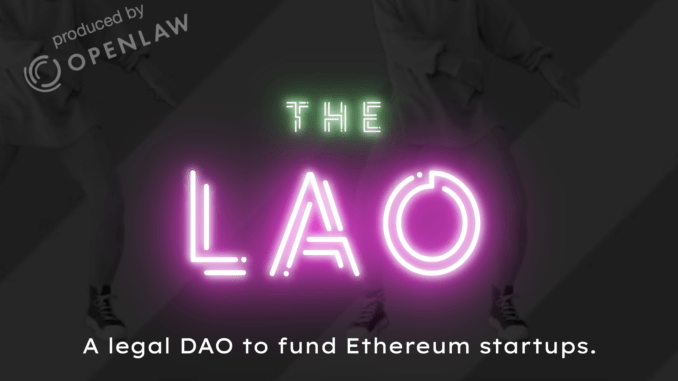
Smart contract pioneer, OpenLaw, is to launch the first ‘limited liability for-profit DAO’, named the LAO. The LAO will enable members to invest in Ethereum-based new ventures and generate a profit. Artificial Lawyer spoke to Aaron Wright, co-founder of OpenLaw, about the new initiative (see below).
But, first, what is this all about? You probably remember The DAO – an early example of a distributed autonomous organisation, started back in 2016, which hoped to create a way for people to co-fund a blockchain-based investment vehicle without needing any bricks and mortar institution to run it.
“we have the tools to create a ‘DAO’ in a way that complies with US law”
In today’s exchange rates The DAO held around $2 billion in Ether. However, it all went sideways when someone found a way to siphon off around a third of the DAO’s funds. Some people saw this as an inevitable result of a DIY structure, while others saw ‘The DAO’, as it was known, as the shape of things to come – it just needed a better structure.
Now, OpenLaw via what it is branding as the LAO, is having another go. But, this time with a strong legal and contractual underpinning.
The LAO will be anchored by 10 founding members, which will be announced shortly. Other interested parties will be able to purchase interests in the LAO, likely through a public sale.
OpenLaw’s official statement says: ‘With the LAO, experimentation with automated governance and the allocation of funds for profit can begin again, spurring innovation in areas like real time royalty and dividend payments, markets for delegates voting rights, and other synthetic assets involving tokenized stock or utility tokens.’
In short, they want to see not just a fund with tokenised cash being splashed out to various projects, but to use the smart contract capabilities of OpenLaw to allow investors – no doubt perhaps with some legal help – to support all manner of derivatives trading and sophisticated investment behaviour based upon token investment.
‘The LAO and similar structures could lead to increased development of secondary trading for LAO interests either through private markets or potentially even on public exchanges, potentially leading to a future of publicly traded venture capital funds,’ they add.
The LAO also builds on recent efforts by OpenLaw to provide an open platform for the creation of complex financial products, in effect a DIY investment bank.

Clearly some will say this is just too ‘out there’ to work or that it will end as The DAO did. Others will respond: we’ve done the ground work over the last few years to make this real and secure. Adding in OpenLaw’s capabilities may also be the missing ingredient that The DAO never had.
We will see.
And now, here’s Artificial Lawyer’s discussion with Aaron Wright at OpenLaw:
– Why do this? Is this a change in strategy for OpenLaw?
No change in strategy. OpenLaw is an open-source protocol for creating and managing legal agreements, that includes automating and better managing the creation of funds and other forms of organisations, including new forms of organisations like decentralised autonomous organisations.
The LAO is just one app that can run on the OpenLaw protocol and we hope that others will use our tools to launch other DAOs in the future.
– Why are you doing this?
‘The DAO’ was the first great experiment with fundraising on blockchain technology, but it wasn’t done in the right way.
It ran into technical and legal issues. Now, with OpenLaw and some advances with smart contract development, we have the tools to create a ‘DAO’ in a way that complies with US law. Much like how Coinbase and other exchanges legitimized the trading of digital assets, we believe we can help individuals set up DAOs that comply with US law.
If we’re successful with the LAO and other experiments, we will have virtualized venture funding, providing ready access to capital to founders around the globe.
– Does this make OpenLaw into a type of investment fund now?
No, OpenLaw is simply helping to administer the fund. The LAO will be member-managed and member-funded.
– How much capital are you hoping to assemble in the LAO?
The DAO initially raised $150 million in Ether (which today would be worth about $2 billion). Who knows if we’ll hit that level of funding.
What we do know is that LAO will have limited membership to comply with US securities laws and will be limited to accredited investors.
There will be 10 founding members and then we will likely help these members facilitate a public sale for the remaining membership interests. We have been in contact with a number of large crypto holders, traditional funds, and family offices who seem eager to participate.
– Will this ‘money’ be denominated in ETH or another type of token?
The LAO will sell membership interests in exchange for Ether. We would like to provide funding to projects / startups in DAI, but will only do so if we can make sure the smart contract side is secure.
– Who will decide what it gets spent on? Who is going to be the ‘manager’ of all of this (or will it be consensus-driven?)
The members will decide.
–
So, there you go. No doubt some readers will be uttering: ‘What…..?’ Others will be reading this and thinking: ‘This could seriously become part of the broader financial sector landscape – and likely generate some very interesting work for law firms.’
Either way, if you’d like to know more, OpenLaw and the LAO would like to hear from you. The main site is here. They have a bunch of social media channels also, and they note that they have a LAO Telegram stream that you can join and comment on.
Well done on this thinking. We working hard in similar ideas in Malta. The world will converge in good ideas in open source domains.